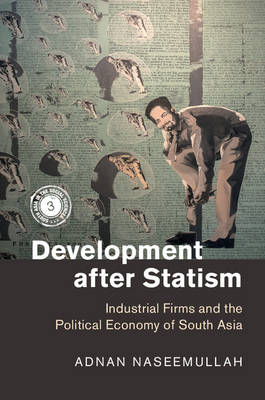
Development after Statism
Cambridge University Press (Verlag)
978-1-316-61125-8 (ISBN)
How can industrial production be managed without the guidance of the state? Adnan Naseemullah discusses industrial development in a new era of drastically constricted state capacity, from the perspective of the manufacturing firm. India's manufacturing economy has been growing after state promotion has receded. How, then, does Indian manufacturing develop in this context? Naseemullah argues that Indian firms must create production structures themselves, investing in networks of capital and labor without signals from above. Depending on manufacturers' backgrounds, these relationships are based either on formal rules or through personal ties, creating a patchwork of institutions that crosscut region and sector. As a result, many firms have been able to regain some certainty for investment, but at the cost of national coherence and the possibility of broader transformation. As a mirror case, this book also explores Pakistan's industrial trajectories, in which similar dynamics suggest the broader applicability of this framework.
Adnan Naseemullah is Lecturer in International Relations and South Asia at King's College London. He received his Ph.D. in political science at the University of California, Berkeley, and has previously taught at the London School of Economics and Political Science and The Johns Hopkins University, where he was Scharf Fellow in Political Economy. His research interests are in economic development, state capacity and political order, in relation to the Indian subcontinent. His work has appeared in Studies in Comparative International Development and Governance.
1. Introduction; 2. Theoretical framework; 3. The rise and fall of India's Statist development; 4. Industrial finance after Statism in India; 5. Labor management after Statism in India; 6. Indian firms and the international economy; 7. The rise and fall of Pakistan's Statist development; 8. Industrialization after Statism in Pakistan; 9. Conclusion; Appendix 1. Statistical models; Appendix 2. List of interviews; References; Index.
| Erscheinungsdatum | 15.02.2019 |
|---|---|
| Reihe/Serie | South Asia in the Social Sciences |
| Zusatzinfo | 15 Tables, black and white; 15 Line drawings, black and white |
| Verlagsort | Cambridge |
| Sprache | englisch |
| Maße | 151 x 228 mm |
| Gewicht | 500 g |
| Themenwelt | Sozialwissenschaften ► Politik / Verwaltung ► Staat / Verwaltung |
| Sozialwissenschaften ► Soziologie ► Spezielle Soziologien | |
| Wirtschaft ► Betriebswirtschaft / Management ► Allgemeines / Lexika | |
| Wirtschaft ► Volkswirtschaftslehre ► Wirtschaftspolitik | |
| ISBN-10 | 1-316-61125-6 / 1316611256 |
| ISBN-13 | 978-1-316-61125-8 / 9781316611258 |
| Zustand | Neuware |
| Informationen gemäß Produktsicherheitsverordnung (GPSR) | |
| Haben Sie eine Frage zum Produkt? |
aus dem Bereich


